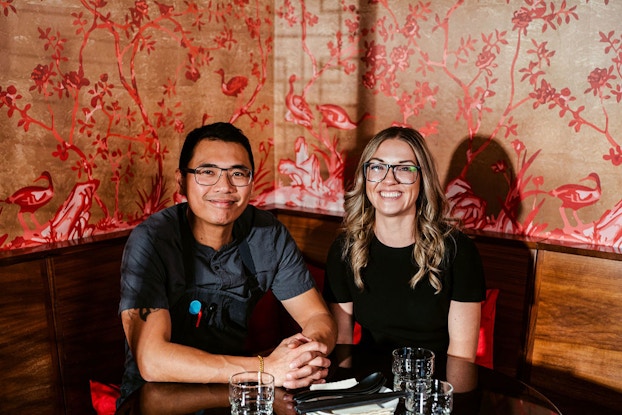
When chef Henji Cheung set out to open his own restaurant, he wanted to create an eatery focused on providing a welcoming and positive company culture. Using his experiences working in various New York City kitchens, Cheung established Queen’s English, a Hong Kong-style Chinese restaurant rooted in Cantonese culture that prides itself on its staff-driven approach.
As a 2022 Minority-Owned Business Award Finalist for the U.S. Chamber of Commerce’s Dream Big Awards and the No. 2 restaurant in Washington Post’s Fall Dining Guide for 2022, Queen’s English has made a name for itself by putting staff at the heart of the business.
“We have a team-first approach,” Cheung said. “Almost all service, food, and beverage standards are a result of collaboration with all associated staff members.”
[Read more: 5 Small Businesses Reveal the Secret to a Powerful Company Culture]
Encouraging staff through empathy and individualization
In his business, Cheung has strived to develop a positive company culture by empowering staff and making them feel comfortable in the workplace — from highlighting each employee’s personality on their website and social media to bonding over a glass of wine each Saturday after service.
“Listen to your staff, give them a voice to speak up,” Cheung recommended. “Be a firm but fair and understanding owner. Empathy can go a long way.”
By taking a team-first approach and collaborating with staff through daily team meetings, Cheung has found ways to offer freedom and flexibility to his staff, while continuing to support his business and provide customers with optimal service.
“What makes us unique [is that] we believe in letting our staff members truly be themselves,” Cheung said. “Our requirements are simple: Be an expert in the food and wine you are selling, be yourself while doing it, and have fun.”
In such a demanding industry, Cheung emphasizes that mental health is of the utmost importance to ensure his staff is cared for — that’s why his business closes on most holidays, and the following day, and offers employees two weeks of paid vacation.
“You can't put onto a spreadsheet someone's mental, physical, and emotional health,” Cheung said. “We must work hard and rest even harder when we are given the chance to do so.”
You can't put onto a spreadsheet someone's mental, physical, and emotional health. We must work hard and rest even harder when we are given the chance to do so.Henji Cheung, Chef Owner, Queen's English
Implementing policies that directly benefit staff
To provide for staff, while still ensuring the longevity of the business, Cheung has taken an innovative approach to offering benefits — most notably by introducing a 4% Wellness Fee policy on customer bills, which has received a positive response from both staff and customers alike.
“[Through the policy,] staff can pick any plan of their choice, and we will cover 50% of [the] cost,” Cheung said. “The 50% that we cover, half [of that] comes out of [the] Wellness Fee [and] the other half comes from Queen’s English, so there is more Wellness fee left. Then, the remainder of the Wellness goes directly to the back-of-house team.”
With this system, Cheung has been able to offset the cost of health insurance coverage for his team while keeping menu prices at the same rate for customers. Providing transparency to customers and allowing them to opt out of the fee if desired — which, according to Cheung, has only happened in rare instances — gives staff at the restaurant essential coverage and the opportunity to earn bonuses.
[Read more: 6 Things Every Boss Should Do to Build an Amazing Company Culture]
A positive workplace culture can extend into the local community
At the heart of a successful business is a staff that is adequately trained and prepared to meet the demands of customers; however, Cheung understands that good service doesn’t end there. To offer customers the best dining experience possible, Cheung encourages his employees to take it a step further.
“We focus our energy on training, learning, and being experts on what we are serving first — we take that part very seriously,” Cheung said. “However, once we are serving guests, we tell the team to treat each dinner service like you are personally hosting an elegant dinner party and you've invited all your best friends that you want to show off to.”
Being an open and empathetic employer and allowing employees to have a say in the business has led to more than just a positive workplace culture — it’s impacted the local neighborhood and built a community of regulars within the restaurant.
“The interpersonal connection [our team members] have with a guest while being a constant professional has cultivated our best regulars,” Cheung said. “Now that's a bottom line item we're all about.”
CO— aims to bring you inspiration from leading respected experts. However, before making any business decision, you should consult a professional who can advise you based on your individual situation.
CO—is committed to helping you start, run and grow your small business. Learn more about the benefits of small business membership in the U.S. Chamber of Commerce, here.

What can membership do for your business?
Gain tools to stay informed, competitive, and connected by becoming a U.S. Chamber of Commerce member. Membership gives you direct access to expert policy insights, economic updates, and exclusive resources designed to help your business thrive. From behind-the-scenes analysis from D.C. to exclusive discounts and expert support, U.S. Chamber membership helps you navigate change and seize new opportunities.







